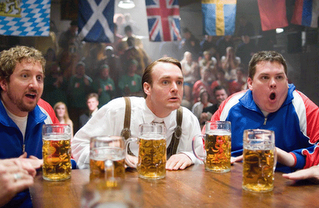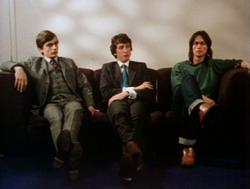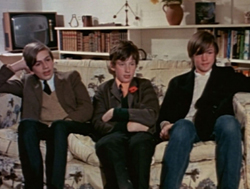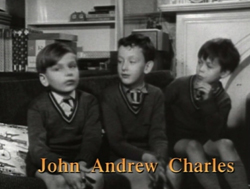
So you like beer and tits? Well, I’ve got the movie for you. “Beerfest,” the latest by Jay Chandrasekhar’s Broken Lizard Productions (“Super Troopers” “Club Dread”), explores the question of what would happen if grown men got to drink beer with a purpose. Imagine it; what if your family name and the pride of your country depended on your drinking lots of good, German beer with your buds. It’s the best male fantasy since that two women at the same time thing, and “Beerfest” takes us along for the ride.
Broken Lizard veterans Paul Soter and Eric Stolhanske are the Wolfhouse brothers, a couple of fun-lovin’, beer-drinkin’ fellas who trek to Germany to dispose of their grandfather’s ashes during Oktoberfest. There they discover that their grandfather is actually a bastard of the late Baron von Wolfhaus, and that their branch of the family is reviled for having stolen the von Wolfhaus family beer recipe. They are then humiliated in a drinking contest by their German cousins, barely escaping with an ass-kicking.
Once back in America, do the Wolfhouse boys just lick their wounds, get back to their lives, and say “good riddance” to the German side of the family? Heck no! With the clarity of men granted a purpose in life, they put together a drinking team and start training for next Oktoberfest so they can “Get sour on some Krauts!” Jay Chandrasekhar (as Barry Badrinath), Steve Lemme (as Fink), and Kevin Heffernan (as Landfill) round out beer-team USA. (The five team members also constitute the Broken Lizard acting team.) What commences is some seriously fun training. “Beerfest” really invites the audience in to enjoy the good times; I could almost taste every glass! Of course, the guys return to Germany for a big showdown, which is like a drinking-game Olympics. The film is very silly, but irresistibly fun.
Jay Chandrasekhar is doing with his Broken Lizard team something like what Christopher Guest (“Waiting for Guffman,” “Best in Show”) has done, using the same core group of actors in each film. So far, Broken Lizard has peaked with their 2001 cult classic “Super Troopers,” an endlessly quotable, uproariously funny police hijinks comedy. 2004’s “Club Dread” marked a serious step backwards for Broken Lizard, skating by with some mildly amusing Jimmy Buffet jokes and a handful of naked breasts. Fortunately, with “Beerfest” the boys seem to be back on track. This film isn’t nearly the classic that “Super Troopers” is, but it is a hilarious good time that allows these actors a chance to be the funny guys that they are. It also marks a promising return to form for Chandrasekhar and company, who reportedly have a “Super Troopers” sequel slated for 2008. Now that is something to live for!
4 stars.







